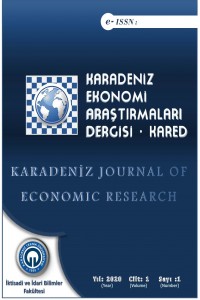Abstract
Finansal hizmetlerde bilgi teknolojilerini kullanarak müşterilerine çözümler üreten “FinTech” (FinTek) şirketlerinin finansal sistemdeki yeri ve önemi her geçen gün artmaktadır. Teknoloji ile finansın 19. yüzyıla kadar uzanan ilişkisinden doğmuş olan FinTek gelişmeleri, üç ayrı dönem halinde ele alınmaktadır: Kıtalararası telgraf sisteminin kullanılmasıyla başlayan ve finansal küreselleşmeyi hızlandıran “1866-1967 dönemi” Fintek 1.0, ATM’lerin kullanılması ve dijital bankacılığın gelişmesini içeren “1967-2008 dönemi” FinTek 2.0 ve nihayet doğrudan halka ve iş çevrelerine finansal ürün ve hizmetler üretebilen ve yoğun bir şekilde bilgi teknolojilerinden yararlanan start-up şirketleriyle şekillenen “2008-günümüz dönemi” de FinTek 3.0 olarak adlandırılmaktadır.
FinTek şirketlerinin finansal sisteme muhtemel etkileri konusunda yabancı literatürde yoğun bir tartışma söz konusudur. Türkiye’de henüz kuluçka döneminde olduğu kabul edilen FinTek’ler; denetim, bilgi güvenliği, merkez bankacılığı ve para politikaları konularında soru işaretleri barındırmaktadır.
Bu çalışmanın amacı, tüm bu gelişmeleri ve muhtemel etkileri genel ve Türkiye özelinde analiz etmektir.
Keywords
References
- Ancri, C. (2016). Fintech Innovation: An Overview. Board of Governors of the Federal Reserve System System, Washington D.C. http://pubdocs.worldbank.org/en/767751477065124612/11-Fintech.pdf (Erişim: 02.08.2019).
- Arner, Douglas vd. (2017). Fintech and Regtech in a Nutshell, and the Future in a Sandbox. CFA Institute Research Foundation.
- Arner, Douglas vd. (2016). The Evolution of Fintech: A New Post-Crisis Paradigm?. University of New South Wales Law Research Series. Research Paper No. 2015/047. 1-46. Sydney.
- BKM (2016). Türkiye Fintech Ekosistemi. https://bkm.com.tr/wp-content/uploads/2016/12/TurkiyeFinTech-EkoSistemi-V10.pdf (Erişim: 26.09.2019).
- Blackman, Phil (2019). Global fintech investment rockets to a record $111.8B in 2018,driven by mega deals: KPMG Pulse of Fintech. https://home.kpmg/xx/en/home/media/press-releases/2019/02/global-fintech-investment-hits-record-in-2018.html (Erişim: 22.10.2019).
- Caruana, J. (2016). Financial Inclusion and the Fintech Revolution: Implications for Supervision and Oversight. Bank For International Settlements. https://www.bis.org/speeches/sp161026.pdf (Erişim: 31.11.2019).
- Consumers International (2017). Banking on the Future: an Exploration of FinTech and the Consumer Interest. https://www.consumersinternational.org/media/154710/banking-on-the-future-full-report.pdf (Erişim: 23.10.2019).
- Dorfleitner, Gregor vd. (2017). Fintech in Germany. İsviçre: Springer International Publishing.
- Erkmen, B. (2018). Fintech Nedir? https://www.halkbankkobigelisim.com.tr/Resources/Sites/57/images/Files/4-HALKBANK_KOBI_GELISIM-Fintech%20Nedir_Bora_Erkmen.pdf (Erişim: 01.11.2019).
- EY Global Limited (2019). Global Fintech Adoption Index 2019. EY.
- EY Türkiye (2018). Türkiye FinTech Ekosisteminin Sürdürülebilir Gelişimi için 23 Öneri. https://bkm.com.tr/wp-content/uploads/2018/02/EY_T%C3%BCrkiye-Fintech-Ekosisteminin-S%C3%BCrd%C3%BCr%C3%BClebilir-Geli%C5%9Fimi-i%C3%A7in-23-%C3%96neri.pdf (Erişim: 26.09.2019).
- Financial Stability Board (2017). Financial Stability Implications from FinTech. https://www.fsb.org/wp-content/uploads/R270617.pdf (Erişim: 30.11.2019).
- Güven, Avni (2019). 2019 Fintech100 Raporu: Listede 2 Türk Girişimi Var. https://fintechistanbul.org/2019/11/25/2019-fintech100-raporu-listede-2-turk-girisimi-var/ (Erişim: 03.12.2019).
- He, Dong vd. (2017). Fintech and Financial Services: Initial Considerations. IMF: Staff Discussion Note.
- Hennings, P. J. (2016). As Fintech Comes of Age, Government Seeks an Oversight Role. http://campfire-capital.com/retail-innovation/payment/fintech-government-seeks-oversight/ (Erişim: 27.11.2019).
- IMF (2019). Fintech: The Experience So Far. Washington, D.C.: IMF Policy Paper.
- Keynes, J. M. (1920). The Economic Consequences of the Peace. Londra: Macmillan & Co. Limited. https://dspace.gipe.ac.in/xmlui/bitstream/handle/10973/24972/GIPE-005472.pdf?sequence=3&isAllowed=y (Erişim: 23.10.2019).
- Lee, David Kuo Chuen vd. (2018). Inclusive Fintech: Blockchain, Cryptocurrency and Ico. Singapur: World Scientific Publishing.
- Lee, D. K. C. ve Teo, E. G. S. (2015). Emergence of FinTech and the LASIC Principles. Journal of Financial Perspectives. 3(3). 1-26.
- Lukonga, I. (2018). Fintech, Inclusive Growth and Cyber Risks: A Focus on the MENAP and CCA Regions. IMF Working Paper 201.
- Mohamed, H. ve Ali, H. (2019). Blockchain, Fintech, and Islamic Finance. Berlin: DG Press.
- Nicoletti, B. (2017). The Future of Fintech: Integrating Finance and Technology in Financial Services. İsviçre: Palgrave Macmillan.
- Peat, Jeremy vd. (2017). Fintech: Hype or Reality?. University of Strathclyde: International Public Policy Institute.
- Pejkovska, M. (2018). Potential Negative Effects of Fintech on the Financial Services Sector. (Basılmamış Tez), Helsinki: Metropolia University of Applied Sciences.
- Startups.watch (2019). Türkiye Girişim Ekosistemi 2018/2019. https://startups-watch-production.s3-eu-central-1.amazonaws.com (Erişim: 2.12.2019).
- Stulz, R. M. (2019). Fintech, Bigtech, and the Future of Banks. NBER Working Paper No. 26312. https://www.nber.org/papers/w26312 (Erişim: 22.10.2019).
- T.C. Cumhurbaşkanlığı Strateji ve Bütçe Başkanlığı (2019a). On Birinci Kalkınma Planı (2019-2023). http://www.sbb.gov.tr/wp-content/uploads/2019/07/OnbirinciKalkinmaPlani.pdf (Erişim: 21.10.2019).
- T.C. Cumhurbaşkanlığı Strateji ve Bütçe Başkanlığı (2019b). 2020 Yılı Cumhurbaşkanlığı Yıllık Programı. http://www.sbb.gov.tr/wp-content/uploads/2019/11/2020_Yili_Cumhurbaskanligi_Yillik_Programi.pdf (Erişim: 2.12.2019).
- Türkiye Cumhuriyet Merkez Bankası (2016). Finansal İstikrar Raporu. Sayı 23. Ankara.
- Türkiye Cumhuriyet Merkez Bankası (2019). Finansal İstikrar Raporu. Sayı 28. Ankara.
Details
| Primary Language | Turkish |
|---|---|
| Subjects | Economics |
| Journal Section | Articles |
| Authors | |
| Publication Date | September 14, 2020 |
| Published in Issue | Year 2020 Volume: 1 Issue: 1 |
Trabzon

